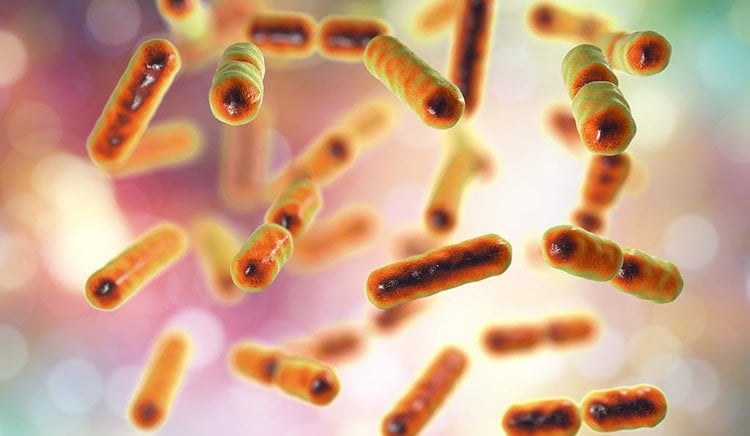Summary: A new study looks at the effect a Western style diet has on the gut microbiome. Researchers report both fructose and glucose block the production of Roc, a protein required for the colonization of beneficial bacteria in the gut.
Source: Yale.
Sugar can silence a key protein required for colonization by a gut bacterium associated with lean and healthy individuals, according to a new Yale study published the week of Dec. 17 in the journal Proceedings of the National Academy of Sciences of the USA.
The gut microbiota plays a key role in human health, and its composition is associated with diet. Until recently, scientists believed that sugar was absorbed into the intestine and never reached the gut. However, recent studies have shown sugar can travel to the colon, where the microbiota resides.
“Given the high consumption of sucrose and fructose in the Western diet, we wanted to know what effect it was having on the composition of the gut microbiome,’’ said Eduardo A. Groisman, the Waldemar Von Zedtwitz Professor of Microbial Pathogenesis and senior author of the research.
Groisman and colleagues studied the effects of a high sucrose/glucose diet in mice on one of those beneficial bacteria, Bacteroides thetaiotaomicron, a species associated with the ability to process healthy foods such as vegetables.

They found that both fructose and glucose, which together form sucrose, block the production of a key protein called Roc, which is required for colonization of this beneficial bacterium in the gut. When researchers engineered a strain of the bacterium that did not silence Roc in response to fructose and glucose, the engineered strain had a colonization advantage in the guts of mice on a high sucrose/glucose diet.
“The role of diet in the gut microbiota goes farther than just providing nutrients,” Groisman said. “It appears that carbohydrates like sugar can act as signaling molecules as well.”
Funding: Yale’s Guy Townsend is first author of the study, which was primarily funded by Yale University and the National Institutes of Health.
Source: Bill Hathaway – Yale
Publisher: Organized by NeuroscienceNews.com.
Image Source: NeuroscienceNews.com image is adapted from the Yale news release.
Original Research: Abstract for “Dietary sugar silences a colonization factor in a mammalian gut symbiont” by Guy E. Townsend II, Weiwei Han, Nathan D. Schwalm III, Varsha Raghavan, Natasha A. Barry, Andrew L. Goodman, and Eduardo A. Groisman in PNAS. Published December 17 2018.
doi:10.1073/pnas.1813780115
[cbtabs][cbtab title=”MLA”]Yale”Sugar Targets Gut Microbe Linked to Lean and Healthy People.” NeuroscienceNews. NeuroscienceNews, 18 December 2018.
<https://neurosciencenews.com/microbiome-sugar-health-10366/>.[/cbtab][cbtab title=”APA”]Yale(2018, December 18). Sugar Targets Gut Microbe Linked to Lean and Healthy People. NeuroscienceNews. Retrieved December 18, 2018 from https://neurosciencenews.com/microbiome-sugar-health-10366/[/cbtab][cbtab title=”Chicago”]Yale”Sugar Targets Gut Microbe Linked to Lean and Healthy People.” https://neurosciencenews.com/microbiome-sugar-health-10366/ (accessed December 18, 2018).[/cbtab][/cbtabs]
Abstract
Dietary sugar silences a colonization factor in a mammalian gut symbiont
The composition of the gut microbiota is largely determined by environmental factors including the host diet. Dietary components are believed to influence the composition of the gut microbiota by serving as nutrients to a subset of microbes, thereby favoring their expansion. However, we now report that dietary fructose and glucose, which are prevalent in the Western diet, specifically silence a protein that is necessary for gut colonization, but not for utilization of these sugars, by the human gut commensal Bacteroides thetaiotaomicron. Silencing by fructose and glucose requires the 5′ leader region of the mRNA specifying the protein, designated Roc for regulator of colonization. Incorporation of the roc leader mRNA in front of a heterologous gene was sufficient for fructose and glucose to turn off expression of the corresponding protein. An engineered strain refractory to Roc silencing by these sugars outcompeted wild-type B. thetaiotaomicron in mice fed a diet rich in glucose and sucrose (a disaccharide composed of glucose and fructose), but not in mice fed a complex polysaccharide-rich diet. Our findings underscore a role for dietary sugars that escape absorption by the host intestine and reach the microbiota: regulation of gut colonization by beneficial microbes independently of supplying nutrients to the microbiota.







